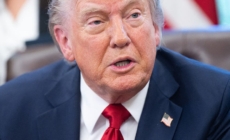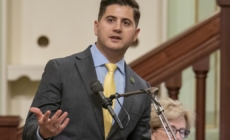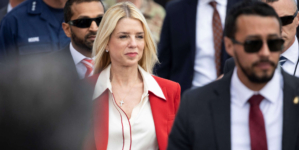-
FBI says online scams raked in record $16.6 billion last year, up 33% from 2023 - 8 mins ago
-
Man suspected of killing a dozen-plus cats arrested in Santa Ana - 20 mins ago
-
UFL 2025: Best mic’d up moments from Week 4 - 21 mins ago
-
Target Boycott Update as Pastor Intensifies Push for DEI - 35 mins ago
-
Hundreds of colleges and universities issue letter condemning Trump’s “political interference” - 47 mins ago
-
Online charter schools skirt California’s childhood vaccine laws - 60 mins ago
-
Teoscar Hernández crushes a home run, giving Dodgers lead over Cubs - about 1 hour ago
-
How to Watch Stars vs Avalanche Game 3: Live Stream NHL Playoffs, TV Channel - about 1 hour ago
-
Rosie O’Donnell was surprised Ellen DeGeneres fled the US due to Donald Trump - about 1 hour ago
-
12 states sue Trump over tariff actions, saying it has “brought chaos to the American economy” - about 1 hour ago
Trump Executive Order Changes College Accreditation: Who Could Be Impacted
President Donald Trump is expected to sign an executive order Wednesday that aims to alter how colleges and universities are accredited, reshaping a fundamental aspect of American higher education.
The directive is part of a broader push to enforce greater intellectual diversity on campuses and has the potential to cause a ripple effect across higher education.
What Will Trump’s Executive Order Do?
According to The Wall Street Journal, as it stands now, the order will change the criteria accrediting agencies must use when evaluating universities, requiring them to include measures of “intellectual diversity” and “student outcomes.” These agencies play a key role in determining whether colleges can access federal funds, including student loans.
The executive order is also expected to increase scrutiny of universities’ political climates and classroom instruction methods. However, the exact language used in the executive order may vary slightly.
Trump’s education agenda includes enhancing technological literacy. As reported by USA Today, another executive order expected to be signed today will direct the Department of Education and the National Science Foundation to prioritize artificial intelligence-focused coursework, teacher training, and related research in K-12 education.
Currently, only the Department of Education and the non-governmental Council for Higher Education Accreditation recognize accrediting bodies for institutions and provide guidelines for these accreditors.
Who Could Be Impacted by the Executive Order?
The move would directly affect accrediting agencies. It is unclear at this time whether agencies will be required to evaluate standards to reflect new federal requirements.
Indirectly, the changes could ripple across the entire higher education landscape, as colleges may adjust faculty hiring, curricula, and campus policies to remain eligible for accreditation—and, by extension, federal funding.
This could also indirectly impact many students who rely on student loans to attend college. Per the Education Data Initiative, in one year, about 28 percent of undergraduate students accepted federal loans.
Meanwhile, K-12 students and educators will be affected by the AI-focused elements of the initiative. A separate executive order will prioritize federal grants for high schools offering AI-related certification and coursework, while also incentivizing AI-related apprenticeships.
AP Photo/Alex Brandon
Donald Trump and Higher Education: Issues Explained
The executive order comes amid ongoing tensions between the Trump administration and elite universities, most notably Harvard.
Trump has taken quick action to make changes in higher education. The White House has threatened several Ivy League schools with federal grant cuts, citing antisemitism.
Trump’s aides have signaled a push to revoke over $1 billion in federal funding from Harvard over its refusal to comply with a list of demands related to campus curriculum and diversity.
This week, Harvard President Alan Garber told NBC that the school had to fight back against what it believes is federal overreaction, and an attempt by the government to withhold funding to control academia.
What Happens Next
The executive order on college accreditation will be signed on Wednesday. Seven executive orders related to education are expected to be signed.
Source link































